Asked about her job, Demi Stacey replies simply. “I love welding,” says the 19-year-old. She is speaking during a
break in her apprentice training at In-Comm, a business based at Aldridge in the West Midlands that is leading the
way in efforts to equip the workforce of the future with vital technical skills.
A report by the government’s National Audit Office in July 2022 warned that the UK faced “a major challenge” in
boosting skills, a factor it said was critical to economic wellbeing. It added: “There is a risk that, despite
government’s greater activity and good intent, its approach may be no more successful than previous attempts to
provide the country with the skills it needs.”
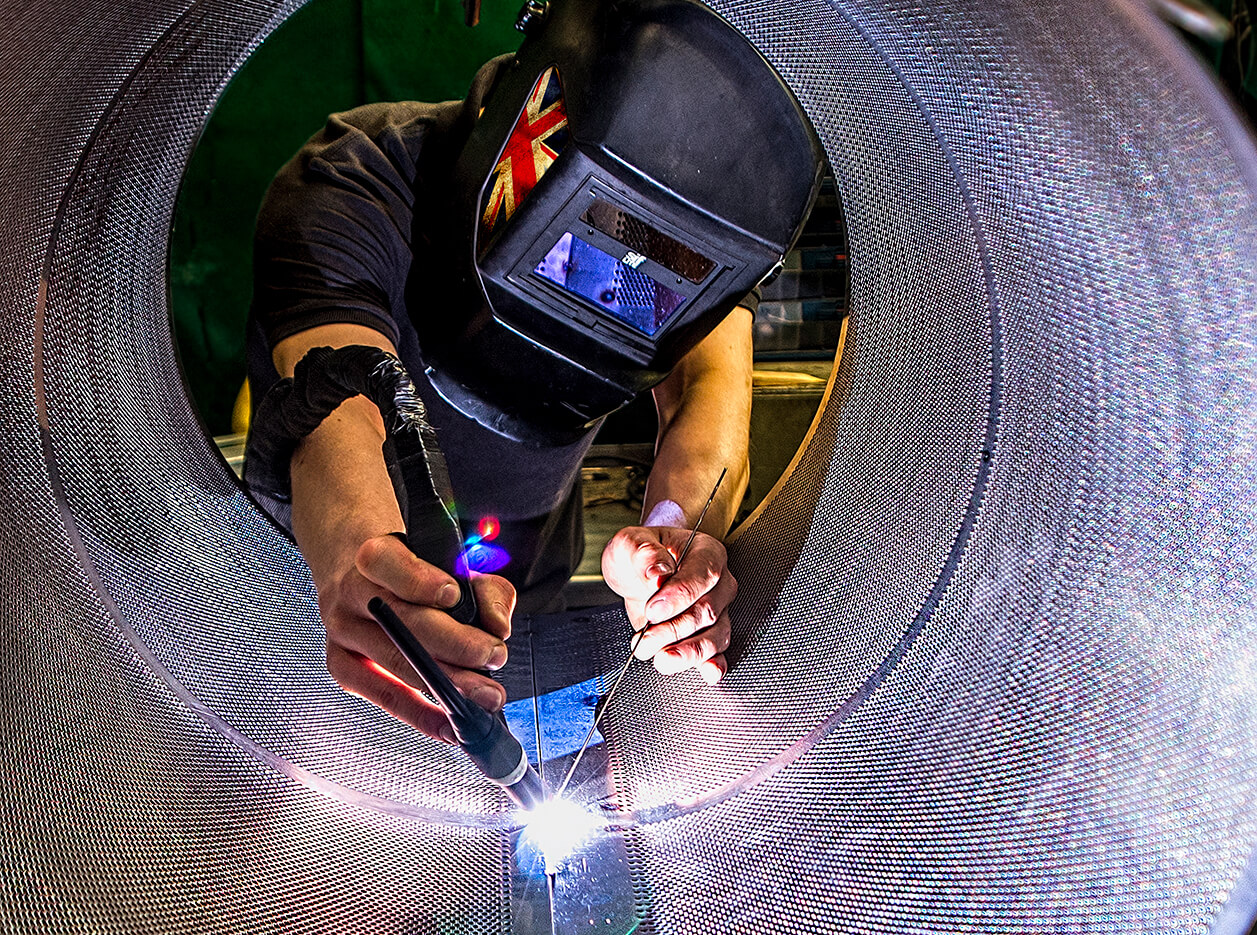 Finding skilled people for technical jobs continues to be a big problem, according to many employers. Photo: Rob Watkins/ Croft Filters.
Finding skilled people for technical jobs continues to be a big problem, according to many employers. Photo: Rob Watkins/ Croft Filters.
Gareth Jones, managing director of the family-owned In-Comm, is doing his best to ensure that such gloomy warnings
are wrong. He favours what amounts to an evangelical approach, devoting considerable effort to working with schools
and other institutions to talk about careers in industry and the type of training that his business can provide.
“There is a special need to attract more young people so we can start to fill the [training] pipeline,” Jones says.
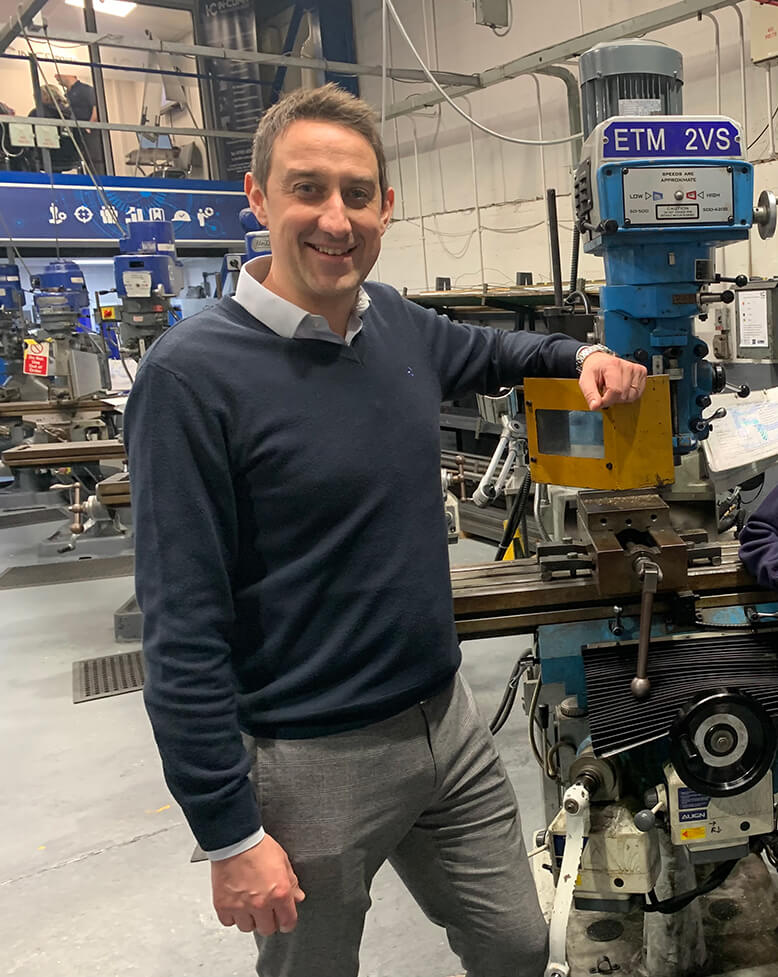 Forming long-term relationships with schools is a vital part of In-Comm’s work, says Gareth Jones, the company’s managing director.
Forming long-term relationships with schools is a vital part of In-Comm’s work, says Gareth Jones, the company’s managing director.
“We spend about £250,000 a year [out of annual sales of just under £4m] on engagement – going to education
establishments including schools and colleges and places such as sports clubs and religious institutions to discuss
what we do. We talk to teachers, students and their parents. Teachers and parents are big influencers for young
people. It’s essential to engage with them as well as the students.”
Stacey is among about 450 people – most of them young and from the Midlands – who have undertaken a technical
apprenticeship at In-Comm during the past year. In addition, another 1,000 have received training from In-Comm to
improve the skills of people already in work. The company has two main centres, Aldridge and Telford in Shropshire.
“The talent pool [in engineering and manufacturing] is much smaller than it used to be,” says Jones. “Employers
continue to report they can’t find the technically qualified people they need. Change in technology and processes is
also driving demand.”
As for linking up with young people and their influencers, Jones believes that building up relationships over a long
period boosts the chances of success. One-off events – during which a student may become interested, only to run
into difficulty arranging any follow-up – are not enough, he says. “We schedule repeat visits [to schools and other
institutions] so that we provide a long-term connection.”
Through such contacts, In-Comm says in a typical year it has contacts with about 5,000 people of varying ages mainly
in the area around Birmingham and Wolverhampton. As evidence that such efforts can pay off, Stacey says she learned
about In-Comm after a company representative came to her school in Aldridge to talk about what it offered. “In-Comm
seemed to provide the type of training and work experience I was looking for,” she recalls.
Stacey chose welding because she’d already gained some experience of it at school. At home, this know-how came in
useful in her spare time. “I used to help my Dad repair bikes and cars,” she says. So far, her experience at In-Comm
“has been great”.
Technical apprenticeships organised by In-Comm typically last about three years – a mix of theory and practical
training, normally including time spent with an employer. In Stacey’s case, she works at Valen Fittings, a pipe
manufacturer in Walsall that she hopes will provide the base for a sound start to a career.
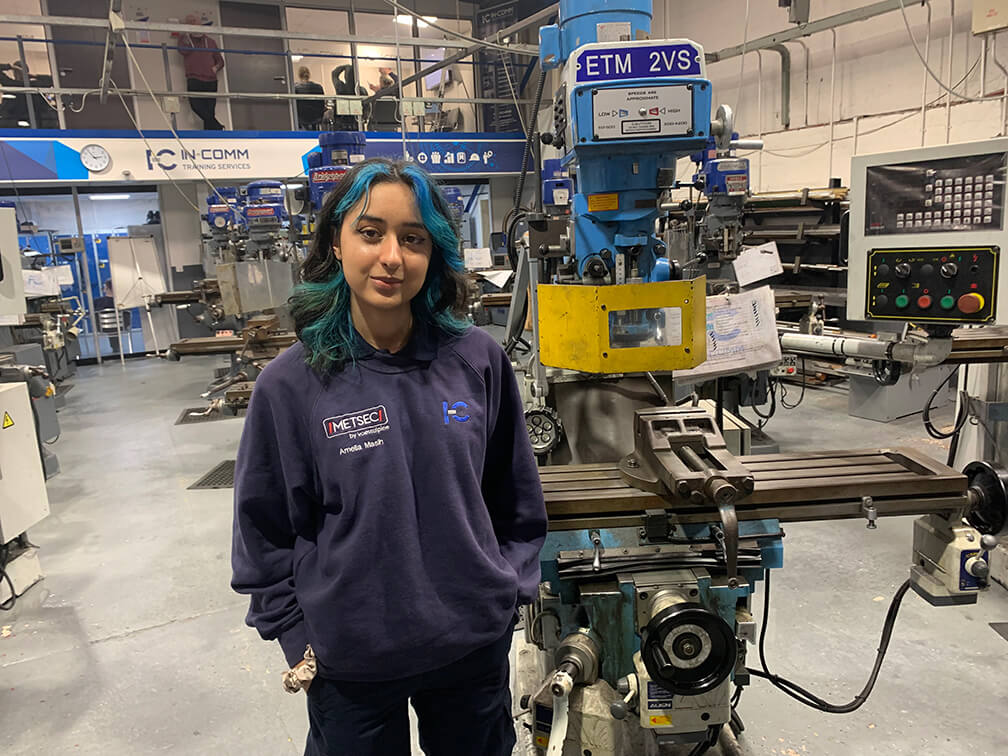 Amelia Masih reckons the engineering sector offers “a secure career and a lot of opportunities”.
Amelia Masih reckons the engineering sector offers “a secure career and a lot of opportunities”.
Another In-Comm trainee at Aldridge is Amelia Masih, aged 17, who started a mechatronics technical apprenticeship at
the company in September 2022. She is training while employed by Metsec, a metal forming business in Oldbury owned
by Voestalpine, an Austrian steelmaker. “When I was growing up, I liked Lego,” says Masih. “I enjoyed doing things
with my hands. I thought engineering would offer a secure career and offer a lot of opportunities.”
Matthew Griffiths, 19, is at In-Comm to do an apprenticeship while working at HCI Systems, a Shropshire based maker
of vehicle wiring equipment. After A-levels, Griffiths thought about going to university, only to reject this option
for a spell learning about electrical installations maintenance, at the same time earning a starting-level salary.
“I decided university wasn’t for me,” Griffiths says. “I thought I’d be better off both by entering the workforce
and learning a skill where there’s a lot of demand.”
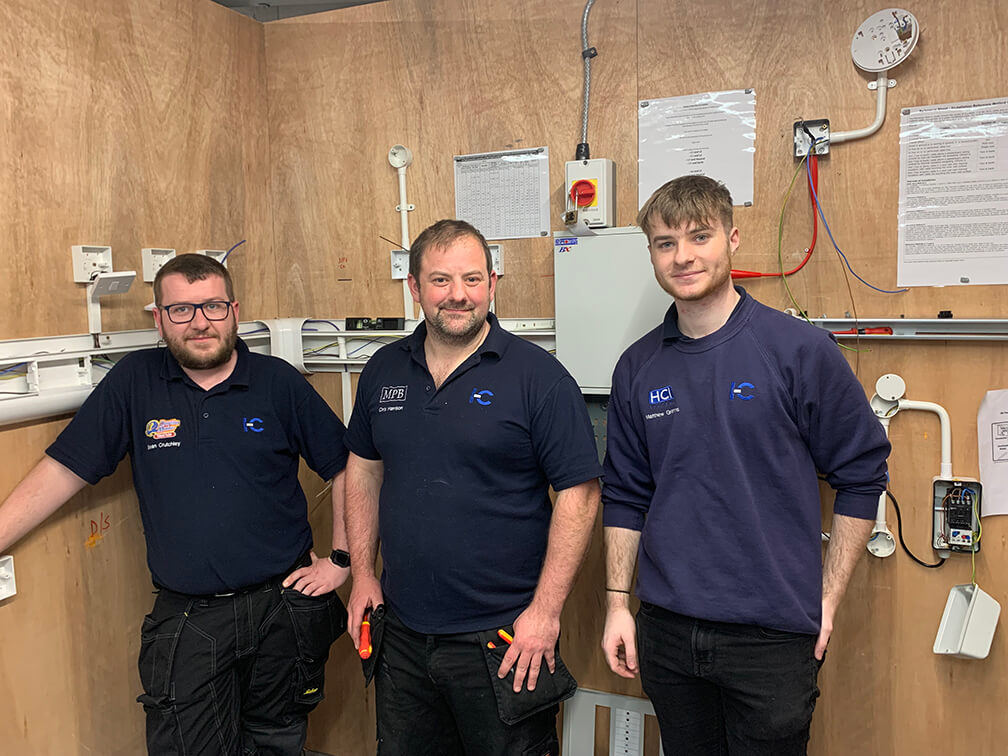 Three In-Comm apprentices (left to right): Sean Crutchley, Chris Harrison and Matthew Griffiths.
Three In-Comm apprentices (left to right): Sean Crutchley, Chris Harrison and Matthew Griffiths.
By 2030, the government wants 200,000 more people in England to complete high-quality skills training every year,
including 80,000 more in the lowest skilled areas. Achieving this would only partly reverse the annual fall of
around 280,000 learners in the most disadvantaged 20 per cent of areas since 2015/16.
There is some evidence that efforts to increase technical skills training are starting to work. Engineering-related
apprenticeship starts in 2021/22 increased at a greater rate than in other subject areas, seeing a rise of just
under 25 per cent. Even so, starts in engineering-related subjects were at the last count 12 per cent lower than in
2016/17.
According to the industry group EngineeringUK, in the next few years the country needs “exponential growth” of
apprenticeships in the engineering sector to meet its economic potential. “Technicians will be particularly vital in
making the UK a leading economic power in low-carbon technology, and we must ensure that we have enough people
skilled to fulfil these roles,” EngineeringUK says.
As for Jones, he says that people involved with technical skills need not only to work hard to address the
challenges, but to be prepared to do this over a prolonged period. “Competence in this [manufacturing and
engineering] sector is about combining knowledge and experience. It won’t happen overnight. This is a long-term
issue – there is no quick fix.”
Industry partnership geared to “developing pride about what you can achieve”
Working closely with industry is a critical part of efforts to create a higher-skilled workforce, according to
training provider In-Comm. The company maintains contacts with about 700 engineering-related businesses, mainly with
factories and other sites in the Midlands, either to liaise on the training of individuals, or to provide
consultancy on topics such as skills know-how or new factory processes.
While some of In-Comm’s collaborations are with large multinationals including Collins Aerospace of the US and
India-owned carmaker JLR, one special partnership is with Birmingham-based Brandauer, a relatively small but highly
regarded manufacturer specialising in metal parts for industries such as electrical goods.
With Brandauer, In-Comm has started an unusual venture aimed at increasing the number of people trained in tooling –
a key technology linked to making the tools vital for industries such as precision metal stamping and plastic
moulding, and one where the UK faces well-documented skills shortages.
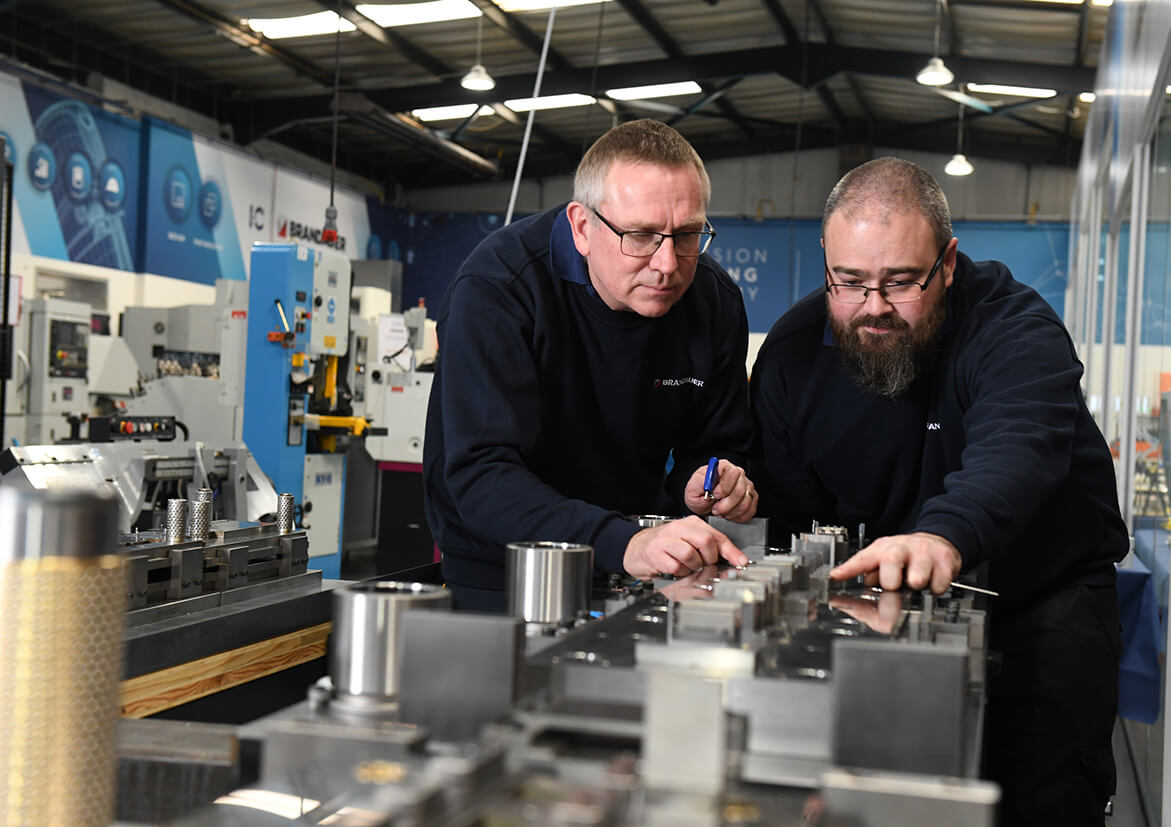 Mark Nicholls (left) and Trevor Francis are among the toolmakers at engineering firm Brandauer who are passing on their skills to young people.
Mark Nicholls (left) and Trevor Francis are among the toolmakers at engineering firm Brandauer who are passing on their skills to young people.
In-Comm and Brandauer have between them spent £1m on new machines at In-Comm’s Aldridge site that will have a dual
role – supplementing Brandauer’s current toolmaking capability at its main Birmingham base and organising training
for a range of people, including Brandauer employees and those working at other manufacturers. The two partners hope
in the first year to offer training places for 35 people – with the first cohort including some workers employed at
JLR. Some of the trainees in the new operation may be new to toolmaking while others may be people already working
in this discipline but who need to add new capabilities.
In-Comm also has a close links on training with companies including the UK subsidiaries of Ricoh and Epson, two big
Japanese manufacturers with established operations in the Midlands, and the UK companies Engineering Technology
Group and IMI.
The courses being offered in the Brandauer partnership on tool process design have been formulated in collaboration
with the Confederation of British Metalforming, an industry body, while Hexagon, a big Swedish IT company
specialising in measurement and design for manufacturers, has also contributed ideas to help with training.
Working at the Aldridge tooling facility is Trevor Francis, a 34-year-old Brandauer toolmaker who has been in this
job since his teens and will play a part in training young people in the new operation. “It’s a great idea to have
this facility here to help boost skills,” he says. “Toolmaking is a job where you work to high precision. You can
develop a real sense of pride about what you can achieve.”
According to Rowan Crozier, Brandauer’s chief executive, the venture will enable his company to increase both its
production of tools – which it believes is vital to its ability to win new orders – and the number of trained
toolmakers available to companies. Brandauer now employs 15 people in toolmaking and over the next few years aims to
add one or two a year if it can find the right people.
Alan Arthur, chief executive of the GTMA, a trade association specialising in tooling, praises the In-Comm/Brandauer
scheme as “an imaginative approach” to training, and Howard Boswell of the Metals Council, an industry body, says it
is needed in the light of what he says is a gradual return of toolmaking to the UK.
Boswell reckons this is happening because of several pressures including changes in the organisation of global supply
chains and a diminished interest by some big manufacturers in “offshoring” production to countries such as China.
“It’s likely we will see a renaissance in toolmaking in the UK in the next few years. This new venture will help
drive it forward.”
